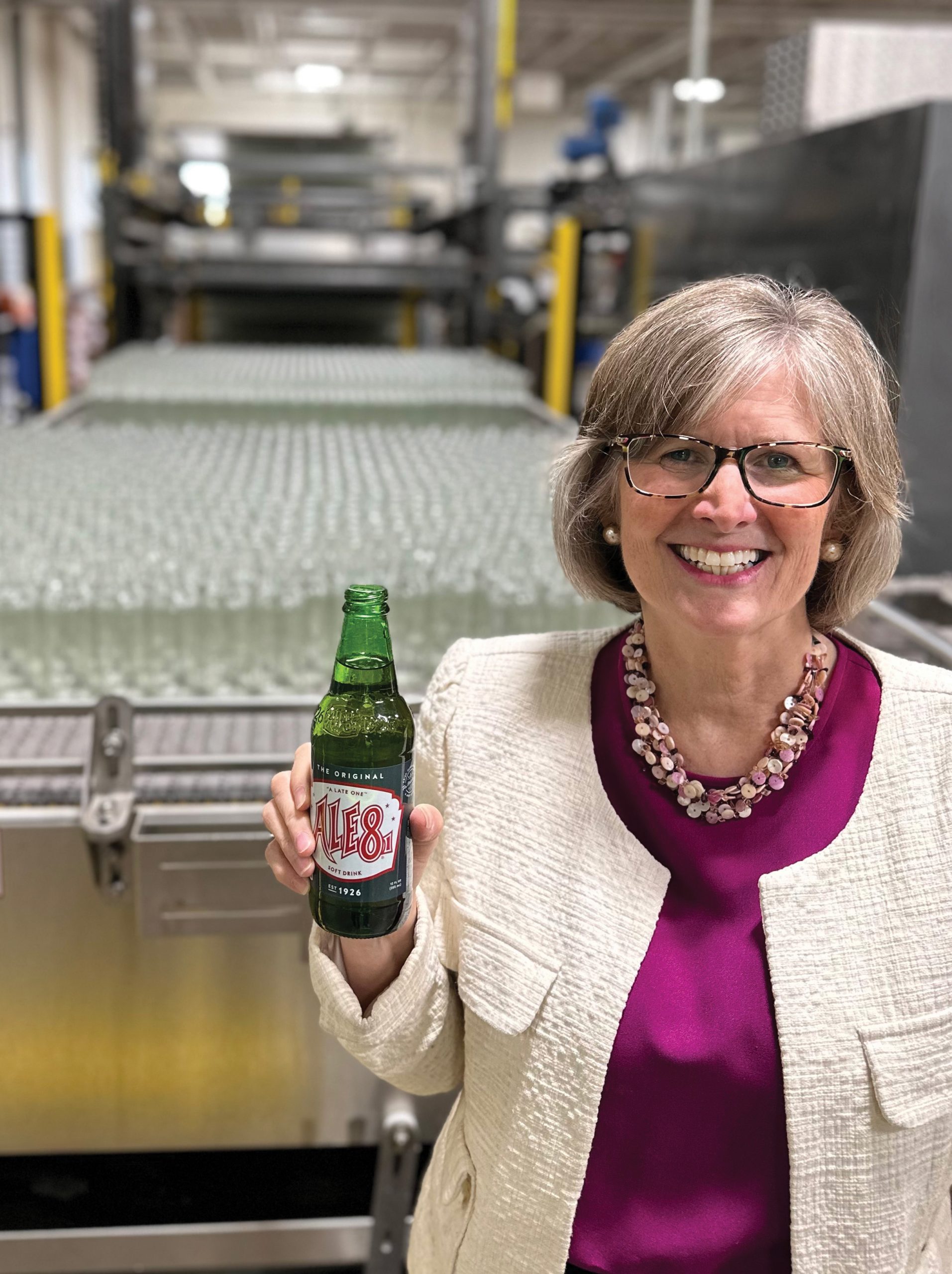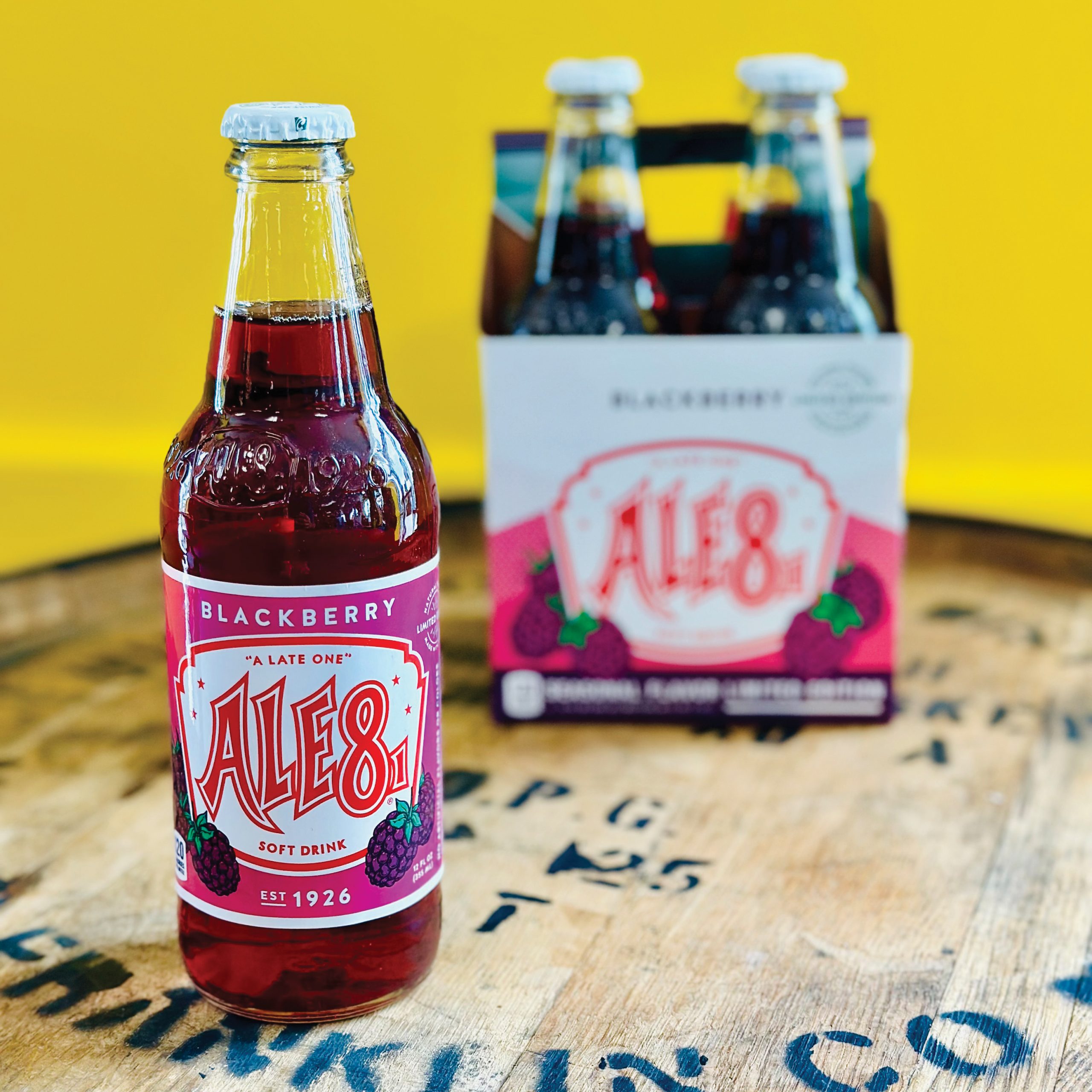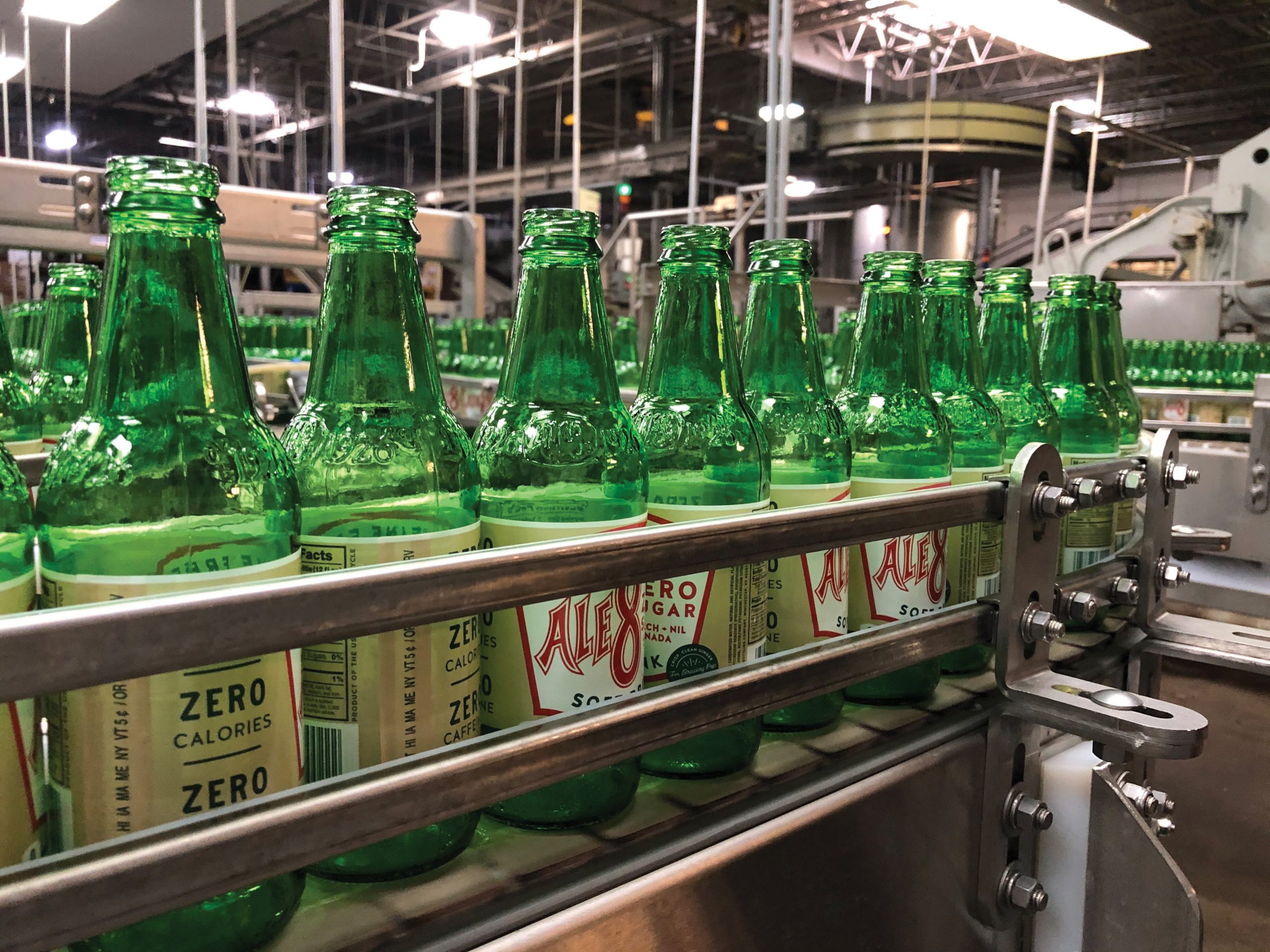 The Lane Report: There used to be hundreds of local soft drinks around the United States. How many are there today?
The Lane Report: There used to be hundreds of local soft drinks around the United States. How many are there today?
Ellen McGeeney: I don’t know but there are not many of us that haven’t either been purchased by one of the big three or gone out of business. The “big three”—Pepsi, Coke and Keurig/Dr. Pepper (KDP)—own most of the nonalcoholic beverages. When we started, every little town had a bottling company. Most of them got a franchise agreement with one of those big guys. Most of the family-owned bottlers who are still around have franchises with Coke, Pepsi or KDP. They have a guaranteed distribution because back in those days the distribution rights were given out in perpetuity.
TLR: How has Ale-8-One managed to stay in business and stay independent when so many others have not?
EM: It’s probably because of our fans more than anything else. The brand has a lot of strength. It’s cool to have something this independent and unique in the same town, in the same green bottle for 120 years. People recognize how rare that is and support it.
We’re just a complete unicorn. It’s incredibly challenging, but it’s also fun trying to figure out how to beat the big boys. We have had our share of good fortune and feel blessed. We feel like somebody’s looking out for us sometimes.
To answer your question more literally, it starts with a good-tasting beverage. If you don’t have that you’re not going to last this long. In their efforts to grow, companies sometime forget who brought them to the dance. We have the best fans in the world. You will never see us come out with “New Ale-8.” You have to fulfill that brand promise to your consumer. We have been the same liquid in the same green glass bottle for as long as anybody alive can remember. That helps. If you build a fan, you can keep that fan.
The second strategy is that we really put our employees first. We’re very small. We have second-generation employees; most of our employees are from around Winchester. We know each other’s names, our families come to our annual picnic and we care about each other. That makes it a different kind of commitment. We work really hard to never do layoffs. We haven’t done any since I’ve been here. That’s always a priority.
We put a lot of money and thought into employee safety. We do have risk in our jobs: people driving trucks and people on our bottling line dealing with glass. When you care about people, safety becomes a really high priority.
We put a lot of time, energy and money into what we can do to make the place safer and better. We bought a bunch of Big Ass Fans for our warehouse to help with the heat, to help it be a better environment to work in. You can’t really put a return-on-investment on that. It didn’t save us any money. It just made it a better place to work. It is that simple. Our employees know that we care.
Also, our vertical integration has enabled us to maintain control over our product. When your product is on somebody else’s truck, it’s more of an afterthought. When it’s on your own truck, it’s the priority. At the end of the day, if the products are not on the shelf at the store, it’s not going to get purchased. We’ve had our own trucks servicing stores for over 120 years. That gives you a better relationship with your important retail partners.
TLR: Is this some of the impact of the family ownership?
EM: The big impact is, they’re steady. With the same family owning it for over 120 years, they take the long view. They don’t want my plan for next year or even for five years; they want the 20-year plan. That gives me a great luxury to not overreact to the bumps along the way. We may not be the hare; we’re more like the tortoise. We just keep on making progress, growing and getting more resilient. The entire time I’ve worked at Ale-8, the family has given me one objective: Make the business more resilient, so it can still be around. We have a very strong culture of continuous improvement. Whether it’s food safety, our distribution model or product development—how can we be more resilient and bring in new consumers? That’s the approach we take to everything.
 TLR: What is a step you’ve taken to become more resilient?
TLR: What is a step you’ve taken to become more resilient?
EM: We’re putting in an ERP (enterprise resource planning) system. Part of being more resilient is we keep up with how our investments do; we have a really strong capital spending planning process. We make sure we are maintaining operations and investing for growth at the same time, whether it’s the bottling line or the fleet or the cold drinks side of the business or our employees or our systems. One of the more fun investments we’ve made recently was creating a position called director of product excellence and innovation. We built an entire physical area just for new product development.
Fielding Rogers, my boss, is the fourth-generation family member. When I first got here, I said to him, “A big part of why Ale-8 is still around is because your great-great uncle developed a great beverage. People love it. That was good product development, and I’d like to replicate that.” We take the long view and recently we’ve made some bigger investments in that. That, to me, is a big part of resilience.
TLR: What operational improvements/investments have you made recently?
EM: We’ve expanded our physical footprint because we have grown over 60% since I’ve been around. We have expanded capabilities on our bottling line. We invested quite a bit in our fleet. We care about the reduction of our carbon footprint and recently added seven hybrid vehicles to our fleet. We replaced our entire forklift fleet with electric forklifts. We have invested in more efficiency on the production line itself; the growth involved more blending tanks, more sweetener tanks. We had to get a new palletizer. We are always thinking about investing in new safety features. We’ve created new positions. We’re so much better at managing our supply chains than we used to be, and that’s taken big investments. We’ve invested a lot in food safety, leadership. We’ve invested in wages and benefits and are increasing the 401k match. We budgeted a physical therapist who works with our employees on how to lift and move without hurting their bodies.
TLR: Although Ale-8 is a private company, do you disclose any financials?
EM: We don’t. We are smaller than everybody thinks. We are quite profitable. We’re very conservative, so we are not leveraged. We have a little over 100 employees. We have really good benefits and work hard to be a good, stable place to work; that’s where some of the focus on profitability comes from. We’re not interested in a crazy-great opportunity in Timbuktu. You’re going to lose money when you go into that new market; probably for five years or so, which is why you have to be right (about expansion). It takes time and a lot of hard work because this business is so execution oriented.
TLR: Your operation ranges from production to packaging to distribution to marketing. What areas, if any, do you outsource?
EM: We have our own distribution in 27 counties, but all our other distribution is outsourced. If you buy Ale-8 in Louisville, that’s coming off a Coca-Cola Consolidated truck—that’s our partner in Louisville. In Cincinnati we have a bunch of distributor partnerships.
Only our facility has a glass bottling line, so whenever you buy Ale-8 in glass globally we enjoy saying that you buy it from the Winchester facility. All the Ale-8 concentrate is made in the Winchester facility. But if you purchase Ale-8 in either cans or the PET packaging (nonglass bottles), that is outsourced. The 20-ounce plastic bottles are packaged in Corbin, Ky., and Speedway, Ind.
TLR: How important is marketing? What forms do you use?
EM: It’s absolutely critical to communicate with and listen to your fans, to continue to be a part of people’s most cherished memories. We’re very embedded in our community. One of our biggest marketing spends is product innovation and sponsoring the big local events in Winchester. We’re not big, don’t do a lot of big things with cash, but we did make for us a pretty sizable donation when the tornadoes hit Western Kentucky and when the flood struck Eastern Kentucky. That’s not really marketing. I don’t think anybody knows we did it, but I think it all circles back. These are our neighbors, and we care. We believe in doing the right thing every day. That’s worked for us. I think it’s why we’re still here. We do spend a lot of money on sampling, in store or at an event. When we do these concentric circles in Louisville or Cincinnati or Nashville, we’re always handing people a little bottle of Ale-8 to try. One of the best ways to create a fan is to let them try it because we believe in the drink.
We put a lot of energy into what our displays look like, what our packaging looks like, and how we’re communicating in the store. And obviously, the social and digital media world has become a much bigger part of our marketing effort.
We entered the NIL (name/image/likeness) world for the first time last year and had a partnership with (University of Kentucky quarterback) Will Levis, which was fun. As NIL grows, we’ll probably not be able to afford to do that stuff, but it was really a treat for us to work with Will and now we’re all super engaged in his career to see where it goes.
TLR: You came on as the first nonfamily member CEO. How has that gone?
EM: I remember meeting Fielding for the first time at the facility and he took me to the back corner of the plant where there’s a secret spiral staircase. Fielding has a locked room, which has secret ingredients. He hand-blends the secret family recipe that’s come down through four generations, since 1926.
I’m an eighth-generation Kentuckian so I have my dream job. I feel very fortunate. Fielding is a man of integrity. He cares a lot about the employees. For the first time in my career, I’m able to lead with my values. I pinch myself all the time. How could I possibly be here where I don’t have to worry about the quarterly earnings call and making stupid decisions because of those pressures? Being able to have that long-term view and being a company that values the employees so much is a gift. It’s the coolest brand on the planet. There’s so much cool history.
TLR: What is the biggest current challenge in your business?
EM: For us, it is the size of everybody around us. There’s a lot of competition in beverages; there didn’t used to be so many categories. There are many different options for consumers. When I was growing up, I don’t think there was anything besides soda. Then one day bottled water came along, which we all thought was ridiculous; when I was a kid, water came out of the tap. The big guys

have responded by getting into all those categories. We don’t have the luxury to do everything; we can’t be everything to everybody and don’t need to be. We’re very profitable and successful at what we do. We have good coverage and are expanding geographically—slowly, but we have lots of opportunities even in Kentucky and surrounding states. And we’re growing a lot, particularly into zero sugar. We’re excited about what we’re seeing there. That’s why we developed Cherry Zero and hope to have more offerings.
Cherry was launched in 2018. We launched the Cherry Zero right before the pandemic hit. We launched Orange Cream in 2019 and that’s still out there. Last summer we did a limited-time offer with BlackBerry. The newest one was Peach this spring. We are working on three different flavors right now.
The whole concept of delighting our fans with these limited-time offers is something I’m a big believer in. The retailers love it—it gets them traffic, gets excitement in their retail store. It lifts our base brands when we do it. We’re attracting new consumers through these LTOs and we have some of our long-time Ale-8 fans who enjoy trying the new thing.
TLR: With so much competition in the beverage market, how does Ale-8-One carve out and maintain its space?
EM: It’s execution, execution, execution. And that comes back to owning our own trucks and the fact that we’re the most important thing on that truck. If we had outsourced that we would not be. Our guys on the trucks have relationships with that store manager and those employees, and that gets us space. We are building relationships every day. The other thing goes back to the fans. If we’re not there, they’re going to say something and that makes that store manager make sure it’s on the shelf.
TLR: Is the fact that Kentucky is a unique market part of the reason you have managed to stick around?
EM: Because of our depth of brand awareness and loyalty—which translates into sales—we are more important to the retailers in Kentucky, to our fans in Kentucky, to our distribution partners in Kentucky, and to our suppliers. That focus has been very beneficial to us. Our strategy for growth has been to grow outward in concentric circles; that’s the most profitable way to grow because your marketing spend is most efficient. People already are hearing about you as you bleed on the edges and then you just keep having those edges.
TLR: What is your current geographic range for regular retail distribution?
EM: We have a presence throughout the country. Cracker Barrel probably has the broadest network of any of our retail partners in terms of geography, but we have a good-size footprint with Kroger; we’re in 10 divisions, including Fred Meyer. We have a great partnership with Fresh Market; they have stores from upstate New York to Florida. The bulk of our focus is in Kentucky and the surrounding states.
We’re seeing a lot of growth in Ohio and Tennessee. Our big retail partners are Kroger, Walmart, Speedway and Dollar General. Our trucks are just in the 27 counties in Central Kentucky. We do outsource quite a bit. We have partnerships with distributors for Coke, Pepsi, KDP and Budweiser.
TLR: Is it a goal to expand the Ale-8-One truck distribution beyond the 27 counties?
EM: Not really. We have long-standing partnerships with our distributors, and we have good distributors, so if we expanded our trucks that means we’re taking territory away from those folks. And then we become less valuable to them. The strategy is to have the concentric-circles out and have good business with our distribution partners so that we matter to them.
 TLR: How long does it take to establish a new market? How long do you give yourself?
TLR: How long does it take to establish a new market? How long do you give yourself?
EM: I always say it takes generations: When you’ve grown up with something, it’s really meaningful. I would say after five years you should have some idea but we really do look at it as it takes a generation, because when we make a decision to go into a market, we’re not going to leave; we’re serious. We know we have a good drink. We have a lot of confidence in it. We make the decision, then it’s a matter of executing well, which is hard. It’s a lot of work and takes quite a bit of money, quite a bit of effort. But we don’t give up; we just keep going.



















